Thomas Hooker
Thomas Hooker (July 5, 1586 – July 7, 1647) was a prominent English colonial leader and Congregational minister, who founded the Connecticut Colony after dissenting with Puritan leaders in Massachusetts. He was known as an outstanding speaker and an advocate of universal Christian suffrage.
Thomas Hooker | |
|---|---|
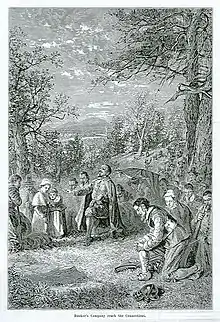 Hooker's Company reach the Connecticut, publishers: Estes & Lauriat, 1879 | |
| Born | July 5, 1586 |
| Died | July 7, 1647 (aged 61) |
| Nationality | English |
| Occupation | Congregational minister |
| Known for | Helped found the Connecticut Colony and write one of the first written constitutions along with a bill of rights. |
| Spouse | Susanna (possibly née Garbrand) Hooker (2nd wife)The name of his first wife is not known[1] |
| Children | 6[1] |
| Signature | |
Called today "the Father of Connecticut", Thomas Hooker was a towering figure in the early development of colonial New England. He was one of the great preachers of his time, an erudite writer on Christian subjects, the first minister of Cambridge, Massachusetts, one of the first settlers and founders of both the city of Hartford and the state of Connecticut, and cited by many as the inspiration for the "Fundamental Orders of Connecticut", which some have called the world's first written democratic constitution establishing a representative government.[2]
Life
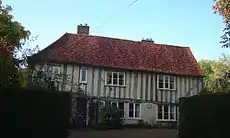
Thomas Hooker was likely born in Leicestershire at "Marfield" (Marefield or possibly Markfield) or Birstall.[3] He went to Dixie Grammar School at Market Bosworth.[4] Family genealogist Edward Hooker linked Thomas Hooker to the Hooker family in Devon which produced the theologian and clergyman Richard Hooker. Other Hooker genealogists, however, have traced Thomas Hooker to Leicestershire. Positive evidence linking Thomas to Leicestershire is lacking since the Marefield parish records from before 1610 perished. Any link to the Rev. Richard is likewise lacking since the Rev. Thomas's personal papers were disposed of and his house destroyed after his death.[5]
In March 1604, he entered Queens' College, Cambridge as a sizar but migrated to Emmanuel College.[6] He received his Bachelor of Arts in 1608 and his Master of Arts in 1611.[4][6][7] In 1609 he was elected to a Dixie fellowship at Emmanuel.[4]
Hooker was appointed to St George's Church, Esher, Surrey in 1620, where he earned a reputation as an excellent speaker[4][7] and became noted for his pastoral care of Mrs. Joan Drake, the wife of the patron. She was a depressive whose stages of spiritual regeneration became a model for his later theological thinking. While associated with the Drake household, he married Susannah Garbrand, Mrs. Drake's woman-in-waiting (April 3, 1621) in Amersham, Mrs. Drake's birthplace.[8]
Around 1626, Hooker became a lecturer or preacher at what was then St. Mary's parish church, Chelmsford (now Chelmsford Cathedral) and curate to its rector, John Michaelson.[4] However, in 1629 Archbishop William Laud suppressed church lecturers, and Hooker retired to Little Baddow where he kept a school.[4] His leadership of Puritan sympathizers brought him a summons to the Court of High Commission. Forfeiting his bond, Hooker fled to Rotterdam in the Netherlands,[7] and considered a position in the English Reformed Church, Amsterdam, as assistant to its senior pastor, the Rev. John Paget.[9] From the Netherlands, after a clandestine trip to England to put his affairs in order,[10] he immigrated to the Massachusetts Bay Colony aboard the Griffin.[1][4]
Hooker arrived in Boston and settled in Newtown (later renamed Cambridge), where he became the pastor of the earliest established church there, known to its members as "The Church of Christ at Cambridge."[11] His congregation, some of whom may have been members of congregations he had served in England,[12] became known as "Mr. Hooker's Company".[4] For a time he lived in Watertown, Massachusetts, but felt that the towns were too close together.[13] When the General Court of Massachusetts allowed residents to split off and found new communities, his group was among the first to go.[13]
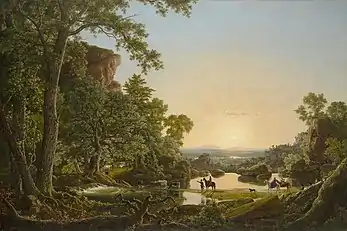
Voting in Massachusetts was limited to freemen, individuals who had been formally admitted to their church after a detailed interrogation of their religious views and experiences. Hooker disagreed with this limitation of suffrage, putting him at odds with the influential pastor John Cotton. Owing to his conflict with Cotton and discontented with the suppression of Puritan suffrage and at odds with the colony leadership,[7] Hooker and the Rev. Samuel Stone led a group of about 100[14] who, in 1636, founded the settlement of Hartford, named for Stone's place of birth, Hertford in England.[15]
This led to the founding of the Connecticut Colony.[4][16] Hooker became more active in politics in Connecticut. The General Court representing Wethersfield, Windsor and Hartford met at the end of May 1638 to frame a written constitution in order to establish a government for the commonwealth. Hooker preached the opening sermon at First Church of Hartford on May 31, declaring that "the foundation of authority is laid in the free consent of the people."[17]
On January 14, 1639, freemen from these three settlements ratified the "Fundamental Orders of Connecticut" in what John Fiske called "the first written constitution known to history that created a government. It marked the beginnings of American democracy, of which Thomas Hooker deserves more than any other man to be called the father. The government of the United States today is in lineal descent more nearly related to that of Connecticut than to that of any of the other thirteen colonies."[18]
In recognition of this, near Chelmsford Cathedral, Essex, England, where he was town lecturer and curate, there is a blue plaque fixed high on the wall of a narrow alleyway, opposite the south porch, that reads: "Thomas Hooker, 1586–1647, Curate at St. Mary's Church and Chelmsford Town Lecturer 1626–29. Founder of the State of Connecticut, Father of American Democracy."[19]
Death and legacy

Hooker died during an "epidemical sickness" on July 7, 1647, at the age of 61, two days after his 61st birthday. The location of his grave is unknown, although he is believed to be buried in Hartford's Ancient Burying Ground where there is a crypt now; there also is a plaque on the back of the First Church. Because there was no known portrait of him, the 1938 statue of him that stands in front of Hartford's Old State House, was sculpted by Frances Laughlin Wadsworth from the likenesses of his descendants.
Hartford is not without a sense of humor regarding its origins. Each year in October, organizations and citizens of Hartford dress up in outrageous costumes to celebrate Hooker Day with the Hooker Day Parade. T-shirts sold in the Old State House proclaim "Hartford was founded by a Hooker."[20]
Views
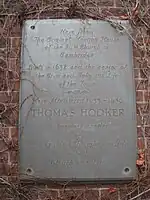
Thomas Hooker strongly advocated extended suffrage to include Puritan worshippers, a view which would lead him and his followers to colonize Connecticut.[4] He also promoted the concept of a government that must answer to the people, stating: "[T]hey who have the power to appoint officers and magistrates, it is in their power, also, to set the bounds and limitations of the power and place unto which they call them" through "the privilege of election, which belongs to the people according to the blessed will and law of God".[4] Thomas Hooker argued for greater religious tolerance towards all Christian denominations.[21]
Hooker defended the calling of synods by magistrates, and attended a convention of ministers in Boston whose purpose was to defend Congregationalism.[4] Hooker later published A Survey of the Summed of Church-Discipline in defense of Congregationalism, and applied its principles to politics and government.[7]
Thomas Hooker was a prominent proponent of the doctrine of preparationism, which taught that by making use of the means of grace, a "person seeking conversion might dispose himself toward receiving God's grace."[22] He believed that much of God's favor needed to be re-earned by men.[23] To Hooker, sin was the most crafty of enemies, defeating grace on most occasions. He disagreed with many of the predecessor theologies of Free Grace theology, preferring a more muted view on the subject. He focused on preparation for heaven and following the moralist character.[23]
Family
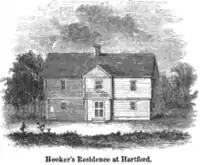

Thomas Hooker came to the colonies with his second wife, Suzanne. Nothing is known of his first wife.
His son Samuel, likely born at Cambridge, Massachusetts, graduated from Harvard College in 1653. He became minister of Farmington, Connecticut, where his descendants lived for many generations.[notes 1] Of Rev. Samuel Hooker, Cotton Mather wrote in Magnalia Christi Americana: "Thus we have to this day among us our dead Hooker, yet living in his worthy son Samuel Hooker, an able, faithful, useful minister at Farmington, in the Colony of Connecticut."
His daughter Mary married Rev. Roger Newton who was a founder and first minister of Farmington, Connecticut. He later went on to be minister in Milford, Connecticut.
John Hooker, son of Rev. Samuel and grandson of Rev. Thomas, served as Speaker of the Connecticut Assembly, and previously as Judge of the state supreme court. James Hooker, brother of John and son of Rev. Samuel, also became a prominent political figure in Connecticut. He married the daughter of William Leete of Guilford, Connecticut, and subsequently settled there. James Hooker served as the first probate judge, and later as speaker of the Connecticut colonial assembly. Rev. Thomas's granddaughter Mary Hooker, the daughter of Rev. Samuel, married the Rev. James Pierpont. Their daughter Sarah Pierpont married the Rev. Jonathan Edwards.
Other descendants of Thomas Hooker include Henry Hooker, John Hooker, Arthur Atterbury, Charles Atterbury Mary Hooker Pierpont, William Howard Taft, Timothy Dwight V, Aaron Burr, William Gillette, William Huntington Russell, Edward H. Gillette, George Catlin, Emma Willard, J.P. Morgan, Rev. Joshua Leavitt, Roger Hooker Leavitt, Hart Leavitt, Frank Nelson Doubleday, John Turner Sargent, Thom Miller, Adonijah Rockwell and Nathan Watson.[1] On May 16, 1890, descendants of Thomas Hooker held their first reunion at Hartford, Connecticut.[24]
Famous Hooker descendants
- Allen Butler Talcott, painter
- John Butler Talcott, industrialist and founder of the New Britain Museum of American Art
- Elon Huntington Hooker, industrialist and founder of the Hooker Electrochemical Company.
Works
- The Application of Redemption. 1659.
- A Brief Exposition of the Lord's Prayer. London: Moses Bell. 1645.
- The Christian's Two Chief Lessons: Self-Denial and Self-Trial.
- The Covenant of Grace Opened.
- The Danger of Desertion Or A Farewell Sermon of Mr. Thomas Hooker.
- An Exposition of the Principles of Religion. 1645.
- Hooker, Thomas (1629). The Poor Doubting Christian Drawn to Christ.
- The Saint's Dignity and Duty. 1651.
- The Soul's Exaltation. London: John Haviland. 1638.
- The Soul's Humiliation. International Outreach.
- The Soul's Ingrafting into Christ. 1637.
- The Soul's Preparation for Christ: Or, A Treatise of Contrition, Wherein is discovered How God breaks the heart, and wounds the Soul, in the conversion of a Sinner to Himself The Soul's Preparation for Christ. 1632.
- A Survey Of The Summe Of Church-Discipline: Wherein The Way Of The Churches Of New England Is Warranted Out Of The Word. London: John Bellamy. 1648.
Notes
- Married to the eldest daughter of Capt. Thomas Willett of Plymouth Colony, a Plymouth merchant and later first mayor of New York City, Rev. Samuel Hooker was the progenitor of all Hookers who claim descent from Rev. Thomas Hooker of Connecticut.
References
- Hooker, Edward; Margaret Huntington Hooker (1909). The Descendants of Rev. Thomas Hooker, Hartford, Connecticut, 1586–1908. Cambridge: Harvard University. p. 231.
henry hooker house .
- Following the Rev. Hooker's sermon in which he declared, "The foundation of authority is laid in the free consent of the people", the Fundamental Orders were adopted by the colony of Connecticut on January 14, 1639 (by New Style reckoning). While some modern historians dispute the claim that this was the first constitution in the western democratic tradition, neither the Mayflower Compact nor the Narragansett communities' agreements established any forms of government. Furthermore, former Connecticut Chief Justice Simeon E. Baldwin upheld the claim in Norris Osborn's History of Connecticut in Monographic Form, declaring that "never had a company of men deliberately met to frame a social compact for immediate use, constituting a new and independent commonwealth, with definite officers, executive and legislative, and prescribed rules and modes of government, until the first planters of Connecticut came together for their great work on January 14th, 1638–9." Drafted primarily by Roger Ludlow, it was the first compact between a government and the people to uphold the Rev. Hooker’s proclamation that the foundation of constitutional authority was with the people. Ref: Osborn, Norris Galpin, Editor, History of Connecticut in Monographic Form (States History Co., 1925); Hooker, John, An Account of the Reunion of the Descendants of Rev. Thomas Hooker (The Salem Press, 1890), p. 27; Logan, Walter Seth, Thomas Hooker, the First American Democrat (The Order of the Founders and Patriots of America, 1904), p. 19; Lutz, Donald S., Stephen L. Schechter & Richard B. Bernstein, Roots of the Republic: American Founding Documents Interpreted, p. 24; CT.gov, The Official State of Connecticut Website [ww.ct.gov/ctportal/cwp/view.asp?a=246434]; Connecticut, History of the USA http://www.usahistory.info/New-England/Connecticut.html.
- Thomas Hooker. 2006. ISBN 978-1-57607-678-1. Retrieved April 19, 2010.
{{cite book}}:|work=ignored (help) - Chisholm, Hugh, ed. (1911). . Encyclopædia Britannica. Vol. 13 (11th ed.). Cambridge University Press.
- Hooker, Edward, "The Origin and Ancestry of Rev. Thomas Hooker,@ a paper prepared by Commander Edward Hooker, U.S.N., and read before the Hooker gathering, August, 1892", The New England Historical and Genealogical Register, by New England Historic Genealogical Society Staff (Heritage Books, 1997), pp. 189–192; The New England Historical and Genealogical Register, Vol. 44, by New England Historic Genealogical Society Staff (N.E. Historic Genealogical Society, 1890), pp. 397–398; Hooker, Margaret Huntington, "Introduction", Hooker, Edward W., The Descendants of Rev. Thomas Hooker: Hartford, Connecticut, 1586–1908, p. ix; Porter, Alice, "Thomas Hooker", Connecticut Magazine, July–August 1906 ; Underwood, Nancy, Ancestry and Descendants of Rev. Thomas Hooker
- "Hooker, Thomas (HKR604T)". A Cambridge Alumni Database. University of Cambridge.
- "Hooker, Thomas (1586-1647)". Encyclopedia of World Biography. 1998.
- Thomas Hooker, Writings in England and Holland, 1626–1633. (Cambridge, MA: Harvard Univ. Press, 1975), p.7.
- Thomas Hooker, Writings in England and Holland, 1626–1633. (Cambridge, MA: Harvard Univ. Press, 1975), p.25.
- Thomas Hooker, Writings in England and Holland, 1626–1633. (Cambridge, MA: Harvard Univ. Press, 1975), p.33 et passim.
- Records of the Church of Christ at Cambridge in New England: 1632–1830, Boston, MA: Putnam, 1906).
- Williams, G.H., Thomas Hooker, Writings in England and Holland, 1626–1633. (Cambridge, MA: Harvard Univ. Press, 1975), p. 33.
-
- Hanson, Robert Brand (1976). Dedham, Massachusetts, 1635-1890. Dedham Historical Society. p. 14.
- Lucas, Beverly Johnson (August 2002). "History in houses: the Butler-McCook house and garden in Hartford, Connecticut". The Magazine Antiques. pp. 88–96.
- Walker, George Leon, Thomas Hooker: Preacher, Founder, Democrat (Dodd, Mead and Company, 1891), p. 97; Allen, Morse S., & Arthur H. Hughes, Connecticut Place Names (The Connecticut Historical Society, 1976), p. 234; Gross, Governor Wilbur L., Sponsor, Connecticut, American Guide Series by Workers of the Federal Writers’ Project of the Works Progress Administration for the State of Connecticut (The Riverside Press, 1938), p. 169.
- Kennedy, David; Lizabeth Cohen; Thomas A. Bailey (2006). The American Pageant 13th ed. Boston: Houghton Mifflin. p. 49. ISBN 0-618-47940-6.
- Hooker, Thomas, Lecture delivered at the First Church, Hartford, Connecticut, on May 31, 1638, quoted in Walker, George Leon, Thomas Hooker: Preacher, Founder, Democrat, p. 125; and Trumbull, Benjamin, A Complete History of Connecticut, Vol. I (Maltby, Goldsmith and Co., and Samuel Wadsworth, 1818, and Arno Press, 1972), pp. 20–21.
- Fiske, John, Beginnings of New England, or the Puritan Theocracy in Its Relation to Civil and Religious Liberty (Houghton Mifflin Company, the Riverside Press, Cambridge, 1889), pp. 127–28.
- The Cathedral Church of St Mary, St Peter, and St Cedd, Chelmsford, England, a centre of worship and mission; Brief History "History of Chelmsford Cathedral". Archived from the original on July 19, 2011. Retrieved January 3, 2011.; Thomas Hooker http://www.britannia.com/bios/hooker.html
- Hartford Courant, "Peters Is the Mayor to Lift City's Spirits", September 7, 1993, p. B.1; Hartford.com "Events in Hartford CT | Hooker Day Parade". Archived from the original on July 16, 2012. Retrieved March 31, 2015.
- Goode, Stephe (May 5, 1997). "Why religious persecution violates American values". Insight on the News. pp. 14–15.
- McClymond, Michael J.; McDermott, Gerald R. (2012). The Theology of Jonathan Edwards. Oxford University Press. p. 678. ISBN 9780199791606.
- Parnham, David (December 2008). "Redeeming free grace: Thomas Hooker and the contested language of salvation". Church History: Studies in Christianity and Culture. New Haven, Connecticut: American Society of Church History. 77 (4): 915–955. doi:10.1017/S0009640708001583. S2CID 170249672.
- "In Honor of Thomas Hooker, His Descendants to Hold a Reunion in Hartford, Conn.", The New York Times, May 1, 1890
Further reading
- Sprunger, Keith L. (March 1973). "The Dutch Career of Thomas Hooker". The New England Quarterly. The New England Quarterly, Inc. 46 (1): 17–44. doi:10.2307/364884. JSTOR 364884.
- Tipson, Baird. Hartford Puritanism: Thomas Hooker, Samuel Stone, and Their Terrifying God (Oxford University Press, 2015) xviii, 476 pp.
External links
- Works by Thomas Hooker at Post-Reformation Digital Library
- Who was Thomas Hooker? at Thomas Hooker School History
- Thomas Hooker And The Doctrine Of Conversion by Iain Murray